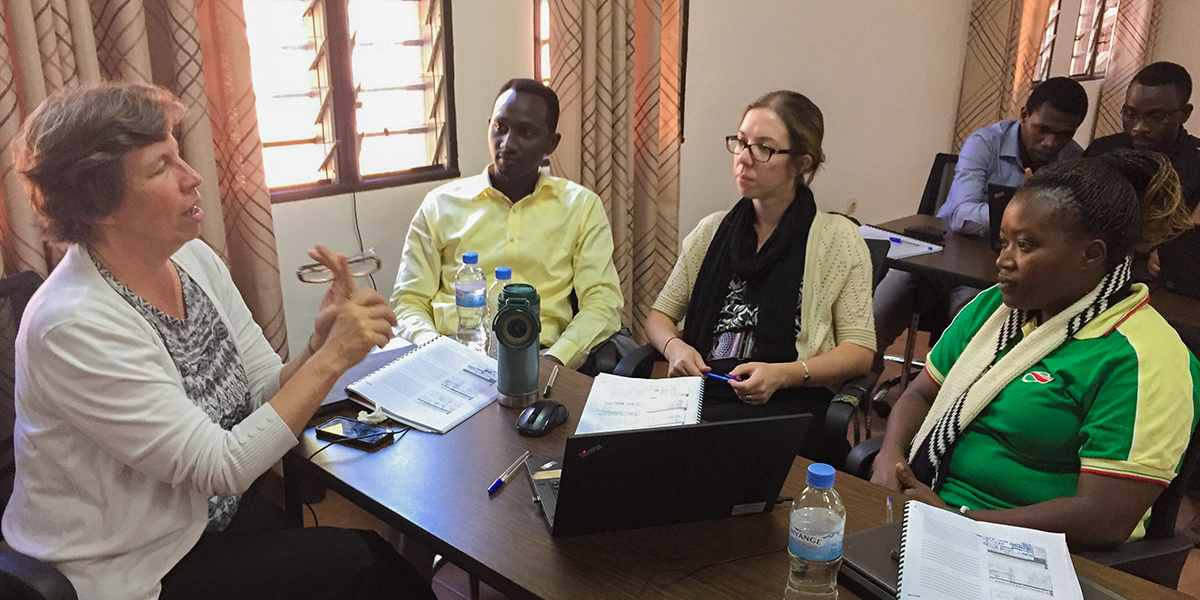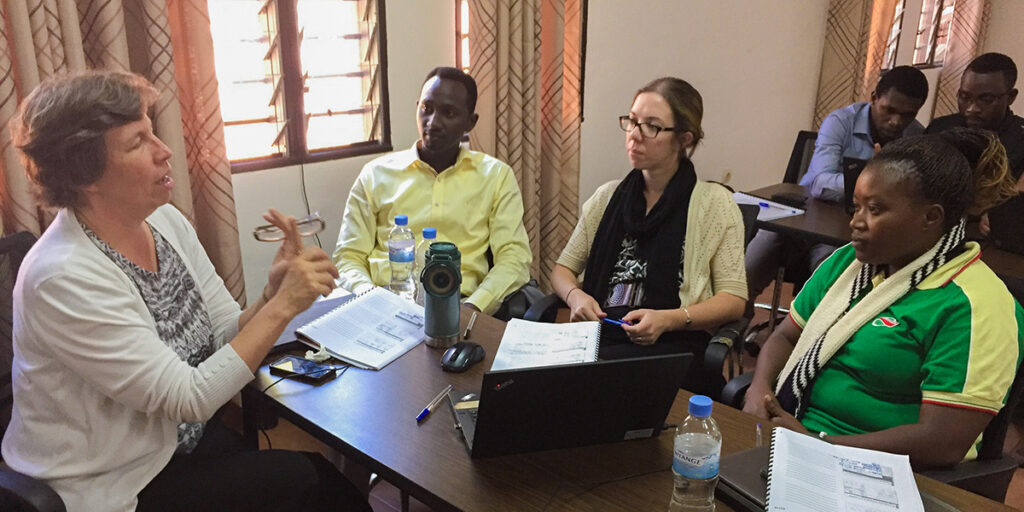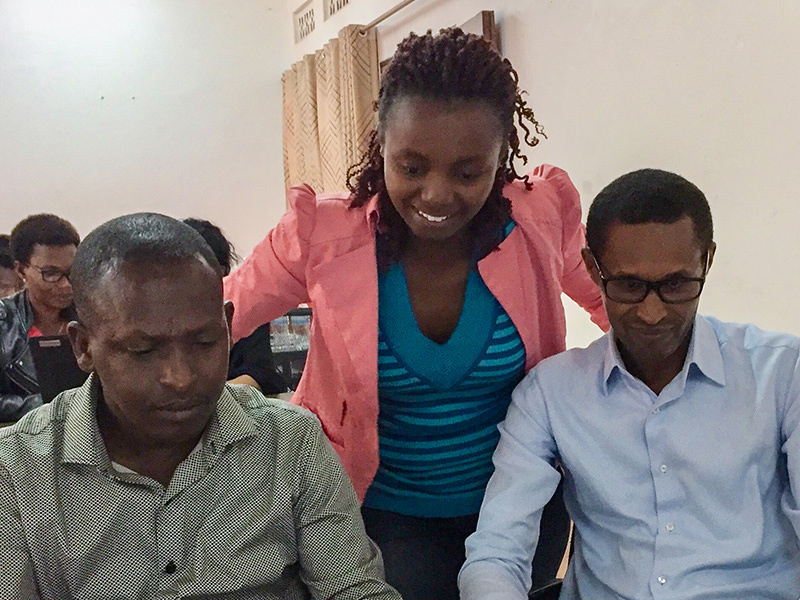Research Training Program Creating Opportunities for Rwanda Health Leaders

PIH and Harvard Medical School have provided research mentoring and resources to more than 50 health workers in Rwanda over the past five years, working to overcome systemic barriers

Working in 2015 as a program manager for Inshuti Mu Buzima, as Partners In Health is known in Rwanda, Theoneste Nkurunziza realized many of the preventable patient deaths he was seeing had a common cause: delays in referring patients from rural health facilities to hospitals outside the country or in Kigali, Rwanda’s capital.
Nkurunziza became interested in researching root causes of those delays, which were barriers to lifesaving care. But he knew, like other health care workers across low-income countries (LICs), that attempting to conduct that research could present difficult trade-offs.
Dr. Megan Murray of Harvard Medical School and Dr. Joel Mubiligi, executive director of Inshuti Mu Buzima, recently described those dilemmas.
“Given limited personnel, facilities, and materials, research comes at short-term costs to patient care, and it is often difficult to predict the long-term value,” Murray and Mubiligi said. “Scarcity is not only a factor in prioritizing health care activities; relatively few LIC health care professionals have the opportunity for research training, and access to medical literature is limited by language, technology, and the cost of journal subscriptions. These barriers make it challenging for even the best-trained LIC researcher to effectively compete for funding.”
The African continent has only 198 researchers per 1 million people, compared to more than 4,000 in high-income countries, a 2019 study found. The disparity persists within Africa itself, with 878 researchers per 1 million people in North Africa but only 88 per 1 million in sub-Saharan Africa.
The Intermediate Operational Research Training (IORT) program in Rwanda, run by PIH and Harvard Medical School, is an effort to change those disparities and create opportunities for new research.
The program has supported 52 researchers over the past five years. Combined, these researchers have led 28 papers that were developed as part of the training. Twenty-seven of those papers have been published, including seven that are part of a special collection published this month by peer-reviewed journal Annals of Global Health.
“Research knowledge and skills needed to produce data-driven evidence for informing routine health care delivery are largely lacking in most low- and middle-income countries,” said Dr. Fredrick Kateera, chief medical officer for Inshuti Mu Buzima. “Through a one-year, hands-on mentorship program, IORT leverages IMB’s partnerships with Harvard Medical School to train health care workers in basic epidemiology and biostatics concepts and practices, using data collected as they manage patients and run clinical programs.”
Additionally, Kateera said, the program supports health care workers “from scientific idea formation to publishing manuscripts,” enabling them to produce scientific evidence that informs clinical and program improvements in locally relevant ways.
Nkurunziza was part of the program’s 2015 cohort.
“I knew that I had the zeal and the willingness to do research,” Nkurunziza said. “Here was an opportunity that most people never have access to—to learn and work on my research paper with support from dedicated staff.”
The program enabled Nkurunziza and a research fellow to collect surgical data, including on referral processes, and publish a 2016 paper, “Referral Patterns and Predictors of Referral Delays for Patients with Traumatic Injuries in Rural Rwanda.”
They found that remoteness of a health facility, type of diagnosis, and urgency of treatment were predictors of delays, and that limited availabilities of ambulances and surgical specialists in district hospitals were root causes. Nkurunziza used evidence from the study to advocate for better referral systems and practices.
He’s also more than returned the program’s support, by mentoring subsequent trainees and leading an Introduction to Research Training course, all while furthering his own work and education.
Nkurunziza has been part of 15 publications since 2016, has presented his findings in four countries, and now is pursuing a PhD at The Technical University of Munich.
Most importantly, the skills he developed in the training program have helped Nkurunziza contribute to research that improves lives in Rwanda and beyond—and he’s not alone.
Child development
Dr. Christine Mutaganzwa was a district clinical director for Inshuti Mu Buzima, in Rwanda’s eastern Kayonza District, when she began the research training program in 2016. She had been looking for an opportunity to conduct research while receiving support and dedicated research time amid the constraints of her demanding position.
The program enabled Mutaganzwa to study the implementation of PIH’s pediatric development clinic, held at two district hospitals to support parents and toddlers in the region. Her research focused on children at risk of developmental delays because of malnutrition, and showed that implementing pediatric clinics was feasible with non-specialized health providers in rural settings, with mentorship and supervisory support.
“I want to make sure that this group of children is cared for,” she said. “I truly appreciated the time (the program) gave me…especially through separated, week-long research training time and the junior mentors who enabled me to concentrate on my research project.”
Mutaganzwa went on to lead the pediatric development clinic, which now features a brand-new facility at PIH-supported at Kirehe District Hospital. Additionally, she has since co-authored 10 papers and recently earned a master’s of medical science in global health delivery at Harvard Medical School. Her thesis explored factors related to follow-up care for parents and children enrolled in the clinics.
Mutaganzwa said the training program is invaluable for nurturing researchers in low-income countries.
“Everyone who has been a part of IORT learns valuable skills and becomes a mentor,” she said. “Many have gone on to excel in their careers.”

All Babies Count
A year after Mutaganzwa, Marie Claire Abimana also used the training program to study child health, as part of the program’s 2017 cohort.
Abimana, a registered nurse midwife, had joined Inshuti Mu Buzima earlier that year, as a quality improvement advisor for a program called All Babies Count. She oversaw mentorship of healthcare professionals, supporting postnatal care and early childhood development in two rural districts.
In the training program, Abimana’s project assessed child development outcomes and found high rates of developmental delays among babies born preterm, with a low birth weight, or with stunting. She recommended improving nutrition and promoting early stimulation for optimum growth.
Abimana said she appreciated the program’s approach to teaching and improving research skills.
“I loved the fact that all lessons included practical examples and homework,” she said. “The feeling of working hard at my own research project while learning complex research competencies like statistical analysis was incredible.”
Like Nkurunziza, Abimana became a junior mentor for the cohort that followed her own, passing on the mentorship she had received herself.
She also has engaged with the growing network of training program alumni to partner on additional research, demonstrating the value that national research training programs have for growing the pool of Rwandan researchers and strengthening collaborations across institutions.
Abimana’s paper is featured in the Annals collection. She’s now pursuing a master’s degree in public health, demonstrating how the research training program is providing not only a year of education and support, but also a platform for lifelong development.
Partnership and accompaniment
The IORT is a core program that invests in the careers of research leaders at IMB and partner organizations in Rwanda. Adapted from the World Health Organization SORT-IT model, the training is a cornerstone of comprehensive investments to strengthen research skill, experience, and infrastructure, with the goal of intensive Rwandan leadership on future research work.
As Murray and Mubiligi noted, the training reflects the long partnership between PIH and Harvard Medical School. The training featured in the Annals collection was mentored by Harvard faculty Bethany Hedt-Gauthier and Dr. Ann Miller, who along with IMB and HMS junior mentors provided more than 1,200 hours of mentorship and research support to trainees. The program aims to accompany emerging researchers through the entire journey of their paper, from idea to publication.
The investments pay off not only in published papers that result, but also in nurturing skills and interest in research among trainees, and in strengthening the research partnership between PIH, HMS and other partners.
“Through IORT, research careers have been unearthed, study findings have been used to influence policy and practice, and evidence produced in Rwanda is influencing health care implementation and improvements in comparable LMIC settings,” Kateera said.
Article originally posted on pih.org.



